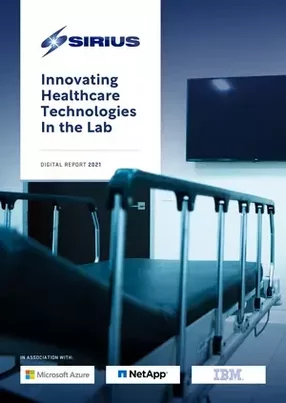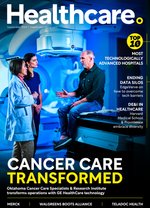Sirius: Innovating Healthcare Technologies In the Lab
Imagine a future where smart hospital platforms facilitate treatment regardless of patient and clinician location, where patients reap the healing benefits of patient distraction devices, and clinicians are freed up from administrative tasks to focus on the patient while automation of those tasks provides more real-time, actionable data. Traditionally, healthcare has been slow to adopt new technologies either for budget reasons or lack of proof of performance. But COVID fast-tracked innovation and adoption of new healthcare technologies—there was no choice.
MemorialCare is a healthcare provider that runs the full gamut of healthcare services with numerous hospitals, free-standing urgent care centres, and dialysis centres throughout southern California. They were an existing client of Sirius Healthcare, who was helping the health system update their infrastructure to sustain the high availability of their clinical applications. “The systems were going down and having high-availability issues,” says Kevin Torres, CTO and CISO at MemorialCare. This problem stemmed from an out-of-date infrastructure. “We went a little too long driving on bald tires, so to speak,” says Torres. “[Sirius] actually dug in, rolled up their sleeves, got dirty and helped [us] get out of that jam.” That made an impression on Torres and established the foundation of trust their relationship would be built on.
Over years of working together, the two organisations developed a deep rapport and mutually beneficial relationship. “Kevin would come to us not with ‘I need to buy some [technology],’ but with ‘here’s a problem I have; can you help me solve it?’” says Imran Salim, SVP of Sirius Healthcare. “That’s the kind of relationship we have.” So when the largest vertical in the $3.8B technology integrator that is Sirius approached MemorialCare to be a clinical partner in creating a Healthcare Technology Innovation Lab that would allow them to innovate, test, and build out new technologies to advance healthcare, it was an easy “yes” for Torres. “They’re really a go-to partner for us, so it was just a natural extension and evolution of our relationship.”
Where Sirius brings the technical expertise to the table, MemorialCare provides the clinical environment where that expertise can be leveraged to better their health system. “There are a lot of partnerships that overlap,” says Torres. He explains that Sirius acts as a broker of those partnerships because they have relationships with all the vendors. “The main benefit is that we’re [all] just trying to take care of patients, period,” says the CTO.
All healthcare providers grapple with the very issue for which Torres first sought help from Sirius—the high availability of critical clinical applications, such as EMRs when systems go down. Patients can’t afford a long downtime should something happen such as an outage or a ransomware attack; their health and wellbeing are literally at stake. “The core of our business is to take care of patients, and we leverage the electronic medical record (EMR) in order to accomplish that,” says Torres. “It has to be available all the time. And even if it does go down, you better have a backup system.”
Full backup and redundancy systems are expensive to buy and maintain, however, so MemorialCare and Sirius set out to create a lower-cost, highly reliable and resilient solution. Working together with their mutual partners Microsoft Azure, NetApp and IBM, they created a Hybrid-Cloud Disaster Recovery (DR) solution that would allow them to activate and scale up or down on-demand, based on usage. Already in play, the Innovation Lab allowed them to test and solve for any latency issues or challenges related to where their data was physically located, whether in the cloud or the data centre, to determine if the solution could be used effectively as a backup if and when there was downtime on the main production system.
“What happened in-between all this testing is quite interesting,” says Torres. “With all the ransomware attacks you’ve heard about in the media, there’s a requirement to protect your data at all costs, and the backup can’t be on the same physical network as your production system,” he explains. Leveraging the lab to test a Hybrid Cloud DR solution put MemorialCare uniquely ahead of the curve.
When the onslaught of ransomware attacks on healthcare began, the foundation for the Hybrid Cloud DR solution had already been laid. “We call it an airgap backup,” says Torres. Where a DR solution primarily consists of an ongoing backup or copy of critical on-premises data to a location on a separate network, Sirius added a third layer—an additional copy of that data backed up to a third location as a read-only, fully encrypted and locked backup. Should the production system suffer an event, this allows the organisation to restore systems back to a date (in this case, 60 days prior) from protected backups, in a sanitised state, where the system and data would be completely clean. This is additional to the shadow read-only or SRO capability that enables restoration of individual applications in lieu of running a full DR. “We have the ability to segmentise or keep it separate from a hacker not only taking [our] production system, but [our] backup system,” says Torres.
As a long-time IBM Power Client, MemorialCare didn’t want to sacrifice the reliability and redundancy provided by IBM Power when it came to the critical operational database for their EMR, even in a DR solution. In addition, NetApp would provide the storage fabric that allowed MemorialCare to seamlessly move data between on-premises, colocation, and public cloud deployed NetApp instances without sacrificing performance or resiliency. Topping it off, Microsoft Azure would provide the elasticity that would make the solution cost-effective. The buy-in and investment of partners such as these are critical to developing and testing cutting-edge technology solutions in the lab.
Because this type of backup system had never been done before with this set of applications and vendors, if they were able to make the solution work reliably, not only would MemorialCare benefit, but all healthcare providers could potentially benefit. That potential is a priority for Salim. He makes it clear that Sirius Healthcare only builds out and tests an idea if they believe it could benefit the majority of the healthcare industry. “The reality is, many people build things and never use them,” says Salim. “All my direct team members have been previous executives at healthcare organisations, so they’ve done Kevin’s job.” Buy-in from his team and other healthcare organisations they work with is the key to rolling out new solutions, and the lab is where they test-drive those solutions.
Collaboration between MemorialCare and Sirius may be the basis for many cutting-edge solutions into the future. Their next big project, Patient Room ‘Next’, is well underway. The rise of telehealth and remote care services in response to the worldwide pandemic changed the way Sirius and MemorialCare are looking at the “patient room,” adopting a philosophy that a patient room is now wherever the patient is treated—be that at home, in a parking lot, or in a hospital room. So they built out a small, fully-outfitted patient room inside the lab to develop and test next-generation technologies.
Currently, the team is testing out the integration of smart technologies and applications into the lab’s patient room including cameras that provide visual monitoring of the patient and the room without breaching patient privacy, speakers and mics that enable distance communication and engagement, touchless sensors that help monitor everything from patient vitals to when people enter and leave the room—all enabled by artificial intelligence to provide real-time diagnostics. “Kevin doesn’t need another 300+ applications in his organisation; he’s got plenty to deal with,” says Salim. The goal is to streamline and simplify clinician workflows, improve productivity, and facilitate better patient experiences and health outcomes. “It becomes an environment where you can really cultivate ideas and innovation,” he says of the lab, “and that’s where the success of it is—having not only the technology people but also having people who understand healthcare.”
We can’t know what the future holds, but with partnerships like the one between Sirius and MemorialCare, the future of patient care seems bright.


